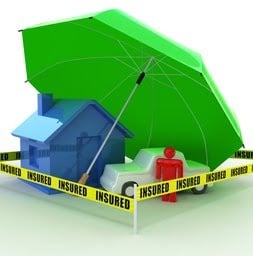An umbrella isn’t just for rain.
We live in an extremely litigious society. Every day, judgments are won, settlements are awarded, and new precedents are set.
My company was working with an affluent client who had relocated from a European country and was purchasing an expensive home in Westchester County, New York. He didn’t understand why we were recommending that he purchase an umbrella insurance policy when his auto and homeowner’s insurance policies included liability limits.
Remember: lawsuits. The homeowner is legally liable for personal injuries on the property. Depending on the injury and the lawsuit, the primary policies might not cut it.
How are you protecting your assets and your lifestyle? Here are some FAQs about umbrella insurance.
What is umbrella insurance?
An umbrella insurance policy is an insurance liability policy that protects assets and income that are above the limits of your primary (or sometimes referred to as “underlying”) auto and homeowner’s policies.
Business owners also should consider an umbrella policy to protect their business ventures.
What happens if I make a claim on my umbrella insurance policy?
When you have umbrella insurance coverage, the insurance company will usually send an attorney to help defend you. This might come in handy in cases of unwarranted lawsuits.
What’s the difference between an umbrella insurance policy and a personal excess liability policy?
Many people don’t understand that these two policies are different. An excess policy goes into effect when the underlying policy is exhausted. The umbrella policy will “drop down” to compensate for coverage gaps in the underlying policy, even if you haven’t reached the underlying insurance policy’s coverage limit.
What kind of coverage do umbrella insurance policies provide?
An umbrella policy, in certain situations, can provide protection not specifically included in an underlying policy like automobile or homeowner’s coverage. Umbrella coverage can provide the following:
- Worldwide coverage, except for liability on property located in a foreign country
- Coverage for non-business-related activities that inflict personal injury, such as false arrest, libel, slander, or wrongful eviction
- Off-premises liability protection
- Coverage for legal defense fees, as long as it’s a covered claim
- Coverage for members of the family or household residents
Do I have to buy umbrella insurance coverage?
You’re not required to purchase umbrella liability insurance. But depending on the value of what you own and how much you’re worth, you may want to consider it.
How much umbrella insurance coverage should I buy?
The bigger question is how much do you have to lose?
An umbrella policy is sold in increments of $1 million. Even if you’re not worth $1 million, you might want to get an umbrella insurance policy for at least $1 million.
In order to determine how much coverage is adequate, you will want to calculate the value of the following:
- Your house
- Any vacation home(s) you own
- Any investment accounts, bank accounts, or other assets in your name
- Your earning capacity and/or annual income, or the household income if you and your spouse or partner both work
- Your future pension income, should you qualify
You may want to seriously consider an umbrella insurance policy if you have any of the following in your life, as these can potentially increase your legal liability and chance of loss:
- Teenagers
- Dogs
- Pools
- Motorcycles
- Boats
- Recreational vehicles
How do I get a discount on my umbrella insurance policy?
If you were able to package your auto insurance and homeowner’s insurance policies together, you may already be receiving an account discount by having multiple policies with one carrier. If you add another policy or two onto the same account, you should ask to receive an even bigger discount.
Linda Rey is a licensed insurance agent at Rey Insurance with a broad spectrum of expertise in life, accident, health, property, and casualty insurance, as well as retirement planning and college funding strategies. Follow her on Twitter: @ReyInsurance
Flood Insurance: What to do Before, During and After a Flood







